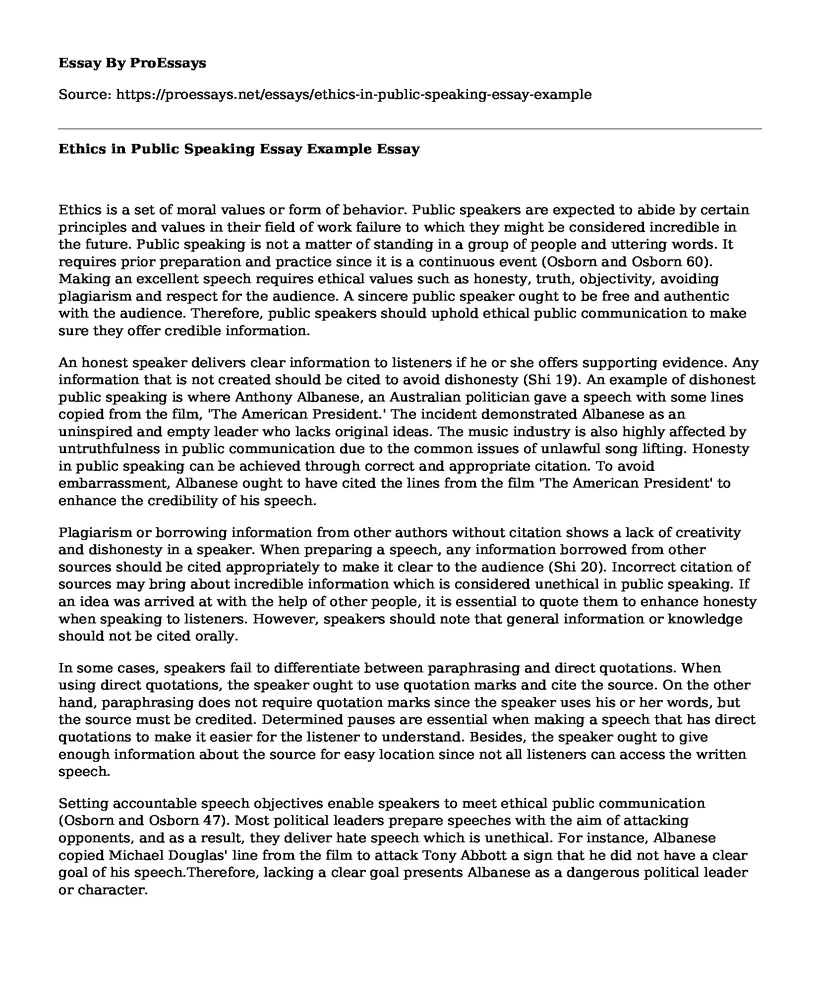Ethics is a set of moral values or form of behavior. Public speakers are expected to abide by certain principles and values in their field of work failure to which they might be considered incredible in the future. Public speaking is not a matter of standing in a group of people and uttering words. It requires prior preparation and practice since it is a continuous event (Osborn and Osborn 60). Making an excellent speech requires ethical values such as honesty, truth, objectivity, avoiding plagiarism and respect for the audience. A sincere public speaker ought to be free and authentic with the audience. Therefore, public speakers should uphold ethical public communication to make sure they offer credible information.
An honest speaker delivers clear information to listeners if he or she offers supporting evidence. Any information that is not created should be cited to avoid dishonesty (Shi 19). An example of dishonest public speaking is where Anthony Albanese, an Australian politician gave a speech with some lines copied from the film, 'The American President.' The incident demonstrated Albanese as an uninspired and empty leader who lacks original ideas. The music industry is also highly affected by untruthfulness in public communication due to the common issues of unlawful song lifting. Honesty in public speaking can be achieved through correct and appropriate citation. To avoid embarrassment, Albanese ought to have cited the lines from the film 'The American President' to enhance the credibility of his speech.
Plagiarism or borrowing information from other authors without citation shows a lack of creativity and dishonesty in a speaker. When preparing a speech, any information borrowed from other sources should be cited appropriately to make it clear to the audience (Shi 20). Incorrect citation of sources may bring about incredible information which is considered unethical in public speaking. If an idea was arrived at with the help of other people, it is essential to quote them to enhance honesty when speaking to listeners. However, speakers should note that general information or knowledge should not be cited orally.
In some cases, speakers fail to differentiate between paraphrasing and direct quotations. When using direct quotations, the speaker ought to use quotation marks and cite the source. On the other hand, paraphrasing does not require quotation marks since the speaker uses his or her words, but the source must be credited. Determined pauses are essential when making a speech that has direct quotations to make it easier for the listener to understand. Besides, the speaker ought to give enough information about the source for easy location since not all listeners can access the written speech.
Setting accountable speech objectives enable speakers to meet ethical public communication (Osborn and Osborn 47). Most political leaders prepare speeches with the aim of attacking opponents, and as a result, they deliver hate speech which is unethical. For instance, Albanese copied Michael Douglas' line from the film to attack Tony Abbott a sign that he did not have a clear goal of his speech.Therefore, lacking a clear goal presents Albanese as a dangerous political leader or character.
Conclusion
When preparing a speech, one should ensure that it is typically respectful, encourages diversity and uses comprehensive language. Speakers should use both sexes and individuals from diverse races when giving examples or when driving particular points. Besides, the speaker should use inclusive language such as 'we as leaders' to stimulate a sense of inclusiveness. In conclusion, it is evident that public speakers ought to uphold ethical public communication to make sure they offer credible information. They should be honest, truthful, respectful, and ought to avoid plagiarism.
Works Cited
Osborn, Michael, and Suzanne Osborn. Public Speaking. Boston: Houghton Mifflin, 2006.
Shi, Ling. "Textual Appropriation and Citing Behaviors of University Undergraduates." Applied Linguistics. 31.1 (2010): 1-24.
Cite this page
Ethics in Public Speaking Essay Example. (2022, Nov 07). Retrieved from https://proessays.net/essays/ethics-in-public-speaking-essay-example
If you are the original author of this essay and no longer wish to have it published on the ProEssays website, please click below to request its removal:
- The Impact of Media on Victims of Terrorism and Ethical Implications for International Psychology
- I Pagliacci Opera Analysis Essay
- The Targeted Citizen: Civic Life Essay Example
- Indianapolis Super Bowl Marketing Analysis Paper Example
- Film Analysis Essay on Ghost in the Shell: Cyborgs, Digital Transformation & Haunting Soundtrack
- Fate in The Iliad: Women & War Prizes - Essay Sample
- Addicted to Social Media: Lucas' Story - Essay Sample







